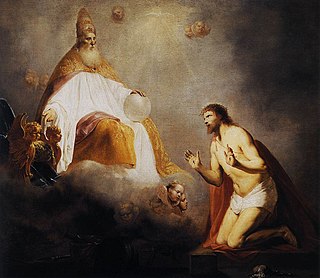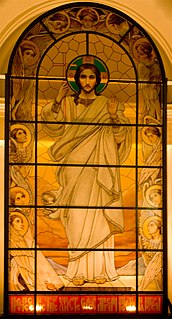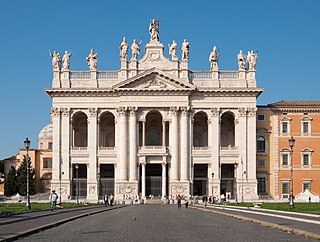
In Christianity, Christology, translated literally from Greek as "the study of Christ", is a branch of theology that concerns Jesus. Different denominations have different opinions on questions like whether Jesus was human, divine, or both, and as a messiah what his role would be in the freeing of the Jewish people from foreign rulers or in the prophesied Kingdom of God, and in the salvation from what would otherwise be the consequences of sin.

Irenaeus was a Greek bishop noted for his role in guiding and expanding Christian communities in what is now the south of France and, more widely, for the development of Christian theology by combating heresy and defining orthodoxy. Originating from Smyrna, he had seen and heard the preaching of Polycarp, the last known living connection with the Apostles, who in turn was said to have heard John the Evangelist.

Original sin is the Christian doctrine that humans inherit a tainted nature and a proclivity to sin through the fact of birth. Theologians have characterized this condition in many ways, seeing it as ranging from something as insignificant as a slight deficiency, or a tendency toward sin yet without collective guilt, referred to as a "sin nature", to total depravity or automatic guilt of all humans through collective guilt.
In Christian theology, divinization, or theopoesis or theosis, is the transforming effect of divine grace, the spirit of God, or the atonement of Christ. Although it literally means to become divine, or to become god, most Christian denominations do not interpret the doctrine as implying an overcoming of a fundamental metaphysical difference between God and humanity, for example John of the Cross had it: "it is true that its natural being, though thus transformed, is as distinct from the Being of God as it was before".
Hypostatic union is a technical term in Christian theology employed in mainstream Christology to describe the union of Christ's humanity and divinity in one hypostasis, or individual existence.
Miaphysitism is the Christological doctrine upheld by the Oriental Orthodox Churches, which include the Ethiopian Orthodox Tewahedo Church, Eritrean Orthodox Tewahedo Church, Coptic Orthodox Church of Alexandria, the Syriac Orthodox Church, the Indian Orthodox Church, and the Armenian Apostolic Church. Rather than using the wording established at the Council of Chalcedon (451) that Jesus is one "person" in two "natures", a divine nature and a human nature, they hold that Jesus, the "Incarnate Word, is fully divine and fully human, in one physis." While historically a major point of controversy within Christianity, several modern declarations by both Chalcedonian and Miaphysite churches state that the difference between the two Christological formulations is essentially semantic and does not reflect any significant difference in belief about the nature of Christ.

The Summa Theologiae or Summa Theologica, often referred to simply as the Summa, is the best-known work of Thomas Aquinas, a scholastic theologian and Doctor of the Church. It is a compendium of all of the main theological teachings of the Catholic Church, intended to be an instructional guide for theology students, including seminarians and the literate laity. Presenting the reasoning for almost all points of Christian theology in the West, topics of the Summa follow the following cycle: God; Creation, Man; Man's purpose; Christ; the Sacraments; and back to God.

In Christian theology, the Imitation of Christ is the practice of following the example of Jesus. In Eastern Christianity, the term Life in Christ is sometimes used for the same concept.

In Christology, the Logos is a name or title of Jesus Christ, derived from the prologue to the Gospel of John "In the beginning was the Word, and the Word was with God, and the Word was God", as well as in the Book of Revelation, "And he was clothed with a vesture dipped in blood: and his name is called The Word of God." These passages have been important for establishing the doctrine of the divinity of Jesus since the earliest days of Christianity.
Eastern Orthodox theology is the theology particular to the Eastern Orthodox Church. It is characterized by monotheistic Trinitarianism, belief in the Incarnation of the essentially divine Logos or only-begotten Son of God, a balancing of cataphatic theology with apophatic theology, a hermeneutic defined by a polyvalent Sacred Tradition, a concretely catholic ecclesiology, a robust theology of the person, and a principally recapitulative and therapeutic soteriology.
Subordinationism is a belief that began within early Christianity that asserts that the Son and the Holy Spirit are subordinate to God the Father in nature and being. Various forms of subordinationism were believed or condemned until the mid-4th century, when the debate was decided against subordinationism as an element of the Arian controversy. In 381, after many decades of formulating the doctrine of the Trinity, the First Council of Constantinople condemned Arianism.

Heresy in Christianity denotes the formal denial or doubt of a core doctrine of the Christian faith as defined by one or more of the Christian churches.

God in Christianity is seen as the eternal being who created and preserves all things. Christians believe God to be both transcendent and immanent. Christian teachings of the immanence and involvement of God and his love for humanity exclude the belief that God is of the same substance as the created universe but accept that God's divine nature was hypostatically united to human nature in the person of Jesus Christ, in an event known as the Incarnation.

In Christian views sin is an evil human act, which violates the rational nature of man as well as God's nature and his eternal law. According to the classical definition of St. Augustine of Hippo sin is "a word, deed, or desire in opposition to the eternal law of God," or as scripture states, "sin is the transgression of the law."

Christian theology is the theology of Christian belief and practice.

The knowledge of Christ refers to one of two possible, and at times related, topics in Christology: one addresses how Christians come to know Christ, the other focuses on the knowledge of Christ about the world. Discussions regarding the knowledge of Christ have had a central place in Christology for centuries. In the 20th century, the interplay between the two concepts was epitomized in the title of a book by Hans Urs von Balthasar: "Does Jesus Know Us? Do We Know Him?"

The Latin Church, also known as the Roman Catholic Church or the Western Church is the largest particular church sui iuris of the Catholic Church, and employs the Latin liturgical rites. It is one of 24 such churches, the 23 others forming the Eastern Catholic Churches. It is headed by the bishop of Rome, the pope – traditionally also called the patriarch of the West – with his cathedra in this role at the Archbasilica of Saint John Lateran in Rome, Italy. The Latin Church traces its history to the earliest days of Christianity through its direct leadership under the Holy See that according to Catholic tradition was founded by Peter and Paul.

The love of Christ is a central element of Christian belief and theology. It refers to the love of Jesus Christ for humanity, the love of Christians for Christ, and the love of Christians for others. These aspects are distinct in Christian teachings—the love for Christ is a reflection of his love for his followers.

The Last Adam, also given as the Final Adam or the UltimateAdam, is a title given to Jesus in the New Testament. Similar titles that also refer to Jesus include Second Adam and New Adam.
In Christianity, the title Son of God refers to the status of Jesus as the divine son of God the Father. In Trinitarian Christianity, it also refers to his status as God the Son, the second divine person or hypostasis of the Trinity, although the phrase "God the Son" cannot be found in the Bible.












